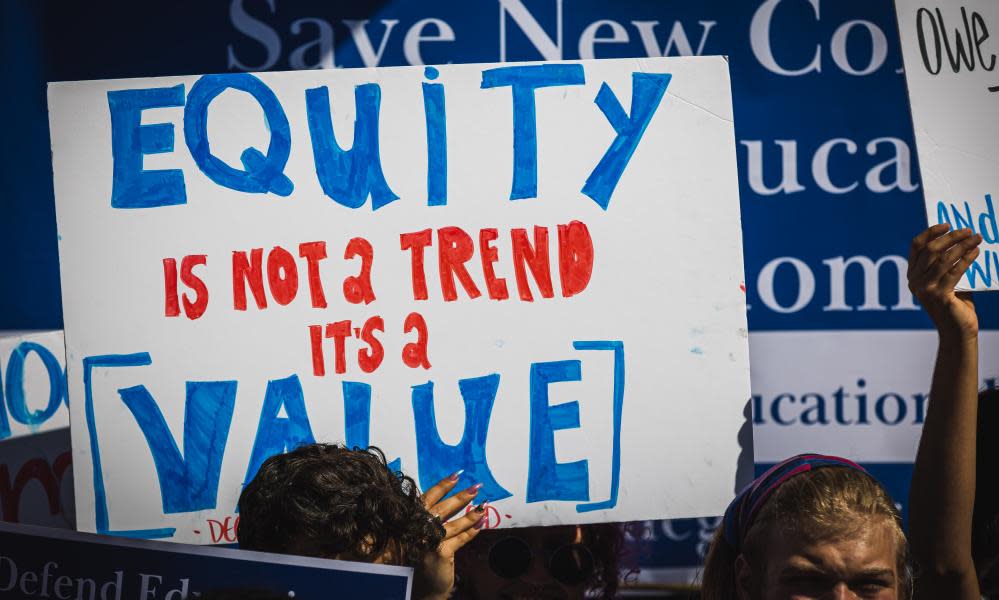Conservatives angry about school ‘indoctrination’ are telling on themselves

The rightwing governor of Florida, Ron DeSantis, and his administration recently blocked a proposed black studies course for advanced placement high school students, as well as announced policies that would inhibit state universities from teaching programming about racial diversity, equity and inclusion or so-called “critical race theory”. These moves follow on the heels of Florida’s “don’t say gay” legislation, last year, restricting teachers from discussing sexual orientation.
DeSantis and other conservative politicians argue that they are saving America’s young from leftwing indoctrination, and that students should instead be exposed to “civic education” that extolls a patriotic vision of America. When DeSantis and his growing number of acolytes present themselves as champions of civic education, however, they are in fact undermining the whole point of civics: not to make children “patriotic” or just fill brains with facts (how many branches of government are there again?), but to enable individuals to be fearless, critical citizens.
That very enterprise is threatened by these systematic intimidation campaigns. In fact, DeSantis’s anti-education crusade is doubly authoritarian – most obviously in its use of state power to suppress ideas and information, but also in its more subtle assumption that teaching is ultimately about imposing doctrines of one sort or another.
It is an open question whether the College Board did cave to pressure from conservatives when they removed supposedly controversial material from the new African American history AP course. It is also an open question to what extent civil rights lawyers and free speech advocates can stop DeSantis’s censorship laws in court. But one thing is clear: damage to US democracy is being done already. Despite valiant resistance, on the whole, teachers and professors are intimidated. As we know from the rise of authoritarianism in other countries and periods, all-out repression is not always necessary: people obey in advance, make small adjustments, or altogether vacate a territory where the red lines which must not be crossed are left purposefully vague.
We also know from anti-education crusades disguised as culture wars in states such as Hungary that defenders of academic freedom are faced with a dilemma, one that is being reproduced in the US today. On the one hand, defenders can try to deny that anything they do is political at all. Education, they might insist, is about science and telling the kids what’s what only in terms of facts.
Less obviously, they might seek to escape politics by emphasizing worthy enterprises like “service learning”. Yet community service, as valuable as it can be both for students and the community, cannot substitute for genuine political education, in which students learn to discuss and, above all, to disagree. As John Hopkins president Ron Daniels has pointed out, students are ever more willing to volunteer, which is great (of course, volunteering also always looks good on CVs, one might add), but less eager to engage democratic politics more directly – and colleges seem complicit in this trend.
Teachers are rightly worried that, in an age of hyper-polarization, politics can make their classrooms explode; often enough, they also lack the time, resources and skills to deal with what can be a drawn-out and difficult process of young people learning how to negotiate their differences in a democratic manner. Add to that the sense that we are falling behind globally in Stem, and hence should not waste time on soft subjects that won’t help us compete with China.
But there is no escape: those declaring the supposed “education establishment” their enemy won’t accept claims that schools aren’t doing politics. The likes of Viktor Orbán and his de facto pupil DeSantis will frame professors as purveyors of dangerous ideologies no matter what. For that is their political business model. Moral panics happen because political entrepreneurs want to spread panic; responses that come down to “don’t panic!” or “let’s talk about something else” won’t work.
That is especially so with propaganda about pedagogy: schooling is so damn close to home, and yet not under the control of those at home; appeals to deep worries about what is happing to the kids when they are out of our hands can be very effective. (It is not an accident that conspiracy theories like QAnon use the quasi-natural resource of parental fears for generating panic and hate.)
So, should one simply concede that it’s all politics, all the time, all the way down, and that everyone is simply spreading their ideology? Of course not. Education is political not because everyone gets to teach their politics to innocent charges, but because it is indispensable for democracy. As John Dewey, the greatest 20th-century philosopher of education put it, “democracy has to be born anew every generation and education is its midwife”. Countries with well-functioning democracies also do well on civic education scores. But that is not just a matter of knowledge about democracy, but doing democracy, which can be uncomfortable, even distressing and guilt-inducing (feelings which the Sunshine State Inquisitors try to banish by law from the classroom).
Good teachers will assist students with how to think through issues; they don’t tell them what to think about issues. It is telling that some conservative crusaders – with an obvious tendency to project their own approach on to others – cannot conceive of teaching this way. To them, education is a weapon; content is not to be debated, but imposed. It is one thing to find fault with the specifics of the “western civ”-style curricula that DeSantis cadres want to do; it’s another to point out that the very approach is a continuation of Trump’s unprofessional 1776 Commission, which can only see history as a patriotic confidence-booster and, indeed, indoctrination.
Jan-Werner Müller teaches at Princeton and is a Guardian US columnist. His most recent book is Democracy Rules

 Yahoo News
Yahoo News 
